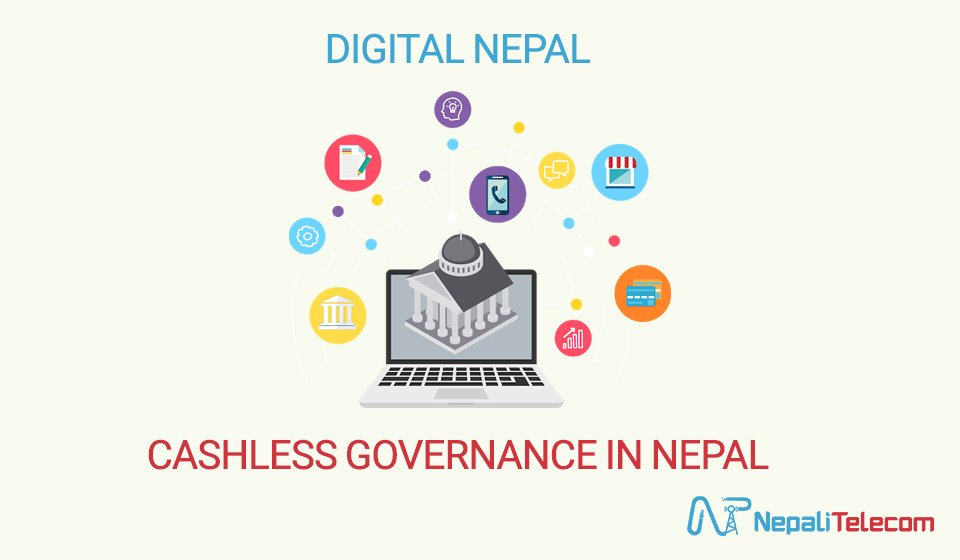Nepal government has announced to make all government transactions cashless within two years with the goal to implement digital governance. As per the recent news, the government is working on making arrangements for electronic payments for every government work. The payment includes individual transactions, including government transactions, and all kinds of business payments.
President Bidhyadevi Bhandari presented the Government’s policies and programs in the parliament on Friday which included such an announcement. She also announced that Nepal will set up its own satellite and bring it into operation within two years. The satellite project, which the government tried to move forward last year, was stalled due to controversy.
Satellite and broadband for rural internet access
In the program, President Bidhaydevi Bhandari also mentioned that “Nepal’s own satellite will be set up and operational within the next two years to expand telecommunication services that aim to provide broadband internet services in the hilly and mountain regions and prevent foreign payments for bandwidth payments.”
To digitize the government works, they plan to print exclusive stickers, postage stamps, land ownership documents (Lalpurja), and documents of public importance in a safe manner. The printing will be done by establishing a safe printing press, which was shelved after the 70 crore audiotape came to light. Gokul Banskota, the then Minister of Communications and Information Technology, resigned after the audio of the bribe bargaining to make the project public became public. Although German and French companies have submitted proposals for setting up security printing, the project has not moved forward since the bribery scandal.
Digital governance and digital payments
The government announced that all the services for Land Revenue Offices (Malpot) will be administered through the online system from the coming fiscal year. It is also informed that the real estate registration has started from 108 Land Revenue Offices across the country. The government seems to be determined to transform traditional land administration into a modern digital system.
As per the policy and program, the flow of government services will be made easy and technology-friendly by integrating and interconnecting the apps used by government agencies. Arrangements will be made to monitor, listen, and address government activities through the integrated app. Although the government has already created websites and apps for almost all local levels, they are limited to providing general information and not for service delivery.
Development of infrastructure
In order to make internet service accessible, arrangements will be made to build infrastructure in partnership with the current internet and telecommunication service providers. Although Nepal Telecommunication Authority (NTA) had formulated the Telecommunication Infrastructure Support Policy a few years ago, it has not been implemented to date. Internet became more expensive in Nepal after the government added 13% telecommunication fees to the internet through the budget two years ago.
To increase the reach of an integrated online system and improve digital governance, the government is set to make arrangements to register personal incidents through an online system from all local levels within the next three years. Although NTA has mobilized funds from the Rural Telecommunication Fund to expand the Internet, questions are being raised about the quality. There are complaints that the internet in these places is slow.
The government has committed to expedite the construction of infrastructure for the establishment and operation of Madan Bhandari University of Science and Technology as a university that can conduct the international level study, teaching, and research in the field of science and technology.
Arrangements will be made to provide online education by producing electronic teaching materials. In addition, there is a program to provide information technology laboratory and high-speed internet facilities in all public secondary schools and campuses.
Is fully cashless governance feasible?
It is a good initiation from the government side to make payments cashless for the government works. The implementation doesn’t seem as easy as the plan. There are a lot of works to be done by the government as there is not even a government-owned payment gateway in Nepal. The implementation of a secured and reliable payment system is definitely challenging. We can see many government employees do not have the proper technical knowledge to operate and run such a system and this is another challenge for the implementation.
The unavailability of bandwidth at the local level in rural areas is very challenging. Online systems are almost impossible to implement without proper internet connectivity and before implementing such systems, the development of proper infrastructure for reliable internet should be carried out.
Having said that, data breach and data security have become a significant issue in the country in present days and this is one of the major points that the government should think of before such implementation. It is a welcoming and appreciable effort from the government to implement such a future-proof system that supports the digital economy that acts as a backbone for the development of a nation.
The government has announced to provide start-up capital for innovative youth and other entrepreneurs and skilled entrepreneurial youth returning from abroad. Even before the policy and program, the national plan has already called for proposals for such capital. The policy and program also have a commitment to provide project-based start-up capital to educated unemployed youth on the basis of educational certificates.













